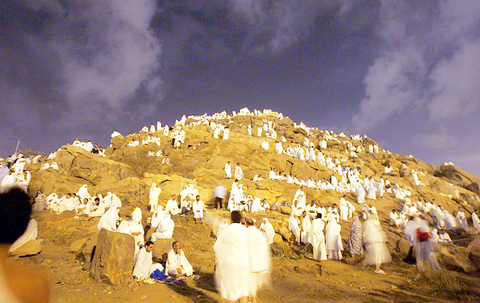Over 2 million Muslim pilgrims started moving at sunrise yesterday toward Mount Arafat to perform the central rite of hajj, the annual pilgrimage to the holy city of Mecca.
In the aftermath of the death of 76 people on Thursday in the collapse of an aging hostel in the heart of Mecca, a senior Saudi official said the kingdom has prepared itself to deal with major potential emergencies during the hajj including fires, stampedes, torrential rain, food poisoning, terror acts and even chemical attacks.
Although some pilgrims, especially Egyptians, had arrived in Arafat the day before, the great majority flocked from the valley of Mina, to the north, where they had spent the night huddled under tents or camped out on the streets with their mats and blankets.

PHOTO: AP
Tracing a journey made by the Prophet Mohammed more than 1,400 years ago, pilgrims were to gather yesterday for an emotional assembly in Arafat, a small plain about 250m above sea level surrounded by mountains on all sides.
They will pray for mercy and forgiveness at the scene of the prophet's last sermon and in a place where some believe Adam and Eve reunited after they were banished by God from paradise, according to the Bible.
The rite of wukuf, or standing, before sunset on Arafat is the high point of the hajj and without which it would be considered incomplete.
More than 1.55 million foreign pilgrims of 177 nationalities are taking part, up 1.2 percent from the previous pilgrimage, Deputy Interior Minister Prince Mohammad bin Nayef Bin Abdel Aziz said.
"This does not include Saudis, foreigners living in Saudi and pilgrims coming on their own outside the tours," Interior Ministry Spokesman Major General Mansur al-Turki said, suggesting an estimate of 2.5 million may be close.
He said the exact number would only be known today when pilgrims begin flocking back to Mina to perform the hajj's most dangerous ritual involving the stoning of three pillars symbolizing Satan's powers.
"This year we drafted a special plan to channel pilgrims to jamarat," said Turki using the the Arabic term for the pillars.
He said pedestrian traffic would move on three main roads while two new tunnels were added to transport pilgrims in buses to the area, which has been the scene of several tragedies, such as a stampede in 2004 that killed 251 and another in 1990 that killed 1,426.
Almost 60,000 security, health, emergency and other personnel are involved in organizing the hajj this year, trying to ensure none of the deadly incidents that have marred it in recent years are repeated.
Also, 14 hospitals and dozens of clinics and field facilities are ready to deal with any contingency.
also see story:
`Hajj' good for the carpet business

Auschwitz survivor Eva Schloss, the stepsister of teenage diarist Anne Frank and a tireless educator about the horrors of the Holocaust, has died. She was 96. The Anne Frank Trust UK, of which Schloss was honorary president, said she died on Saturday in London, where she lived. Britain’s King Charles III said he was “privileged and proud” to have known Schloss, who cofounded the charitable trust to help young people challenge prejudice. “The horrors that she endured as a young woman are impossible to comprehend and yet she devoted the rest of her life to overcoming hatred and prejudice, promoting kindness, courage, understanding

US President Donald Trump on Friday said Washington was “locked and loaded” to respond if Iran killed protesters, prompting Tehran to warn that intervention would destabilize the region. Protesters and security forces on Thursday clashed in several Iranian cities, with six people reported killed, the first deaths since the unrest escalated. Shopkeepers in Tehran on Sunday last week went on strike over high prices and economic stagnation, actions that have since spread into a protest movement that has swept into other parts of the country. If Iran “violently kills peaceful protesters, which is their custom, the United States of America will come to

‘DISRESPECTFUL’: Katie Miller, the wife of Trump’s most influential adviser, drew ire by posting an image of Greenland in the colors of the US flag, captioning it ‘SOON’ US President Donald Trump on Sunday doubled down on his claim that Greenland should become part of the US, despite calls by the Danish prime minister to stop “threatening” the territory. Washington’s military intervention in Venezuela has reignited fears for Greenland, which Trump has repeatedly said he wants to annex, given its strategic location in the arctic. While aboard Air Force One en route to Washington, Trump reiterated the goal. “We need Greenland from the standpoint of national security, and Denmark is not going to be able to do it,” he said in response to a reporter’s question. “We’ll worry about Greenland in

PERILOUS JOURNEY: Over just a matter of days last month, about 1,600 Afghans who were at risk of perishing due to the cold weather were rescued in the mountains Habibullah set off from his home in western Afghanistan determined to find work in Iran, only for the 15-year-old to freeze to death while walking across the mountainous frontier. “He was forced to go, to bring food for the family,” his mother, Mah Jan, said at her mud home in Ghunjan village. “We have no food to eat, we have no clothes to wear. The house in which I live has no electricity, no water. I have no proper window, nothing to burn for heating,” she added, clutching a photograph of her son. Habibullah was one of at least 18 migrants who died